11 Side Effects of the Rabies Vaccine in Dogs
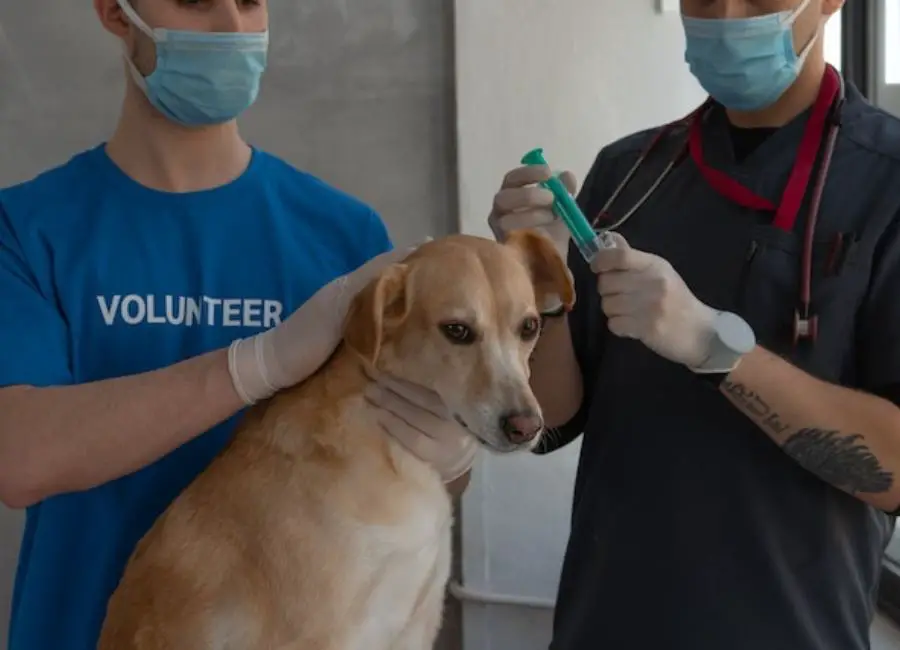
Let’s discuss the most common side effects of the rabies vaccine in dogs…
One of the most important vaccines for dogs is the rabies vaccine, which prevents a deadly virus that can be transmitted to humans as well.
But, have you ever wondered about the side effects of the rabies vaccine? Fear not, we’ve got you covered!
In this post, we’ll take a closer look at what you need to know about the possible side effects of the rabies vaccine in dogs.
So, could you grab a cup of coffee, and let’s dive in…
What are the Side Effects of Rabies Vaccine in Dogs
Some of the common side effects of the rabies vaccine in dogs can include mild fever, loss of appetite, loss of energy, discomfort and swelling at the injection site, vomiting, diarrhea, swollen face, hives, mild coughing, and snotty nose.
In rare cases, severe swelling or pain at the injection site, hives all over the body, lack of appetite, decrease in activity or desire to play, discomfort and swelling at the site of injection, fever, and circulatory shock can occur.
However, adverse reactions to rabies vaccine and immune globulin are not common and newer vaccines today cause fewer adverse reactions than previously available vaccines.
Let’s look at these side effects of the rabies vaccine on dogs one by one for a better understanding…
Common Side Effects of the Rabies Vaccine in Dogs
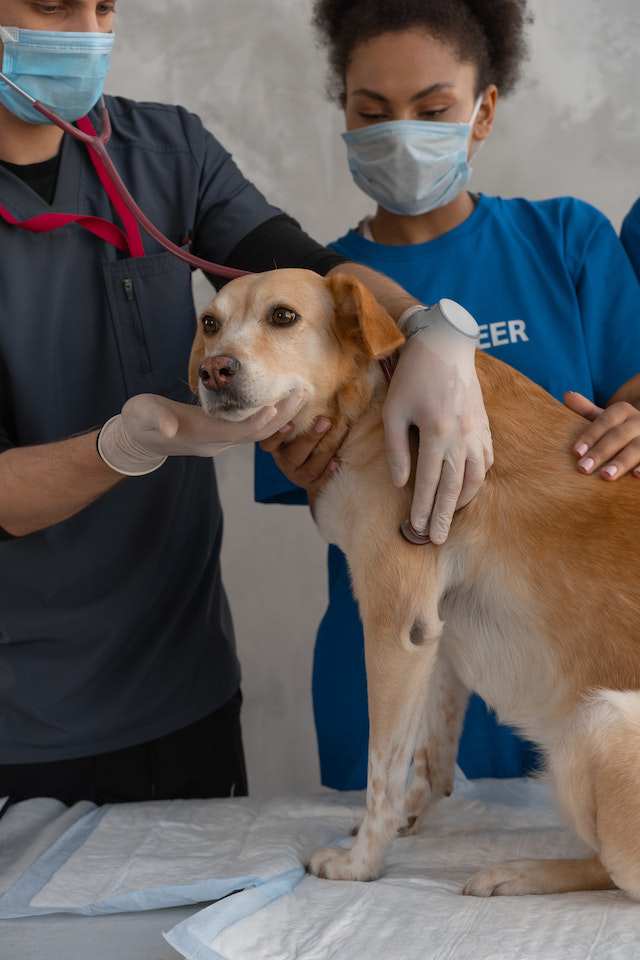
The following are some common side effects of the rabies vaccine in dogs:
1. Hair Loss at the Injection Site
Hair loss may happen at the injection site, usually as a result of slight abrasion or trauma.
Normally, this is only temporary, and the hair will come back over time. Any region that has been gently cleaned with a mild antiseptic solution can aid in preventing infection and accelerating recovery.
It’s crucial to speak with your veterinarian for additional assessment and suitable treatment if the hair loss extends beyond the injection location or if you spot any signs of infection.
2. Localized Swelling and Redness
Some canines may have localized swelling and redness at the injection site after receiving the rabies vaccine.
The immune system’s response to the vaccine’s ingredients causes this reaction.
Usually, the minor swelling and brief redness go away in a few days. Applying a cold compress to the region repeatedly throughout the day will help you manage this side effect.
Relief and a decrease in inflammation may result from this. It’s crucial to avoid using any creams or ointments without first speaking to your veterinarian, as some may slow the healing process.
3. Mild Fatigue and Lethargy
Following rabies immunization, it’s not unusual for dogs to feel a little worn out or lethargic.
As the immune system struggles to process and react to the vaccine, this is a typical reaction.
Make sure your pet receives enough rest, and refrain from doing any strenuous activities for a day or two.
Let them have a peaceful, comfortable night’s sleep free from excessive noise or activity.
Fresh water and a balanced meal will aid in their rehabilitation and help them restore their vitality.
4. Generalized Allergic Reactions
Rarely, dogs may experience allergic responses to the rabies shot. Hives, facial swelling, breathing problems, or collapse are all indications of an allergic reaction.
After your dog has had the vaccination, seek immediate veterinary care if you observe any of these signs.
The severity of allergic responses necessitates rapid medical attention.
To ensure that your veterinarian can make an informed choice about your dog’s vaccination schedule, it is critical to disclose any known allergies or adverse reactions to vaccines.
5. Digestive Upset
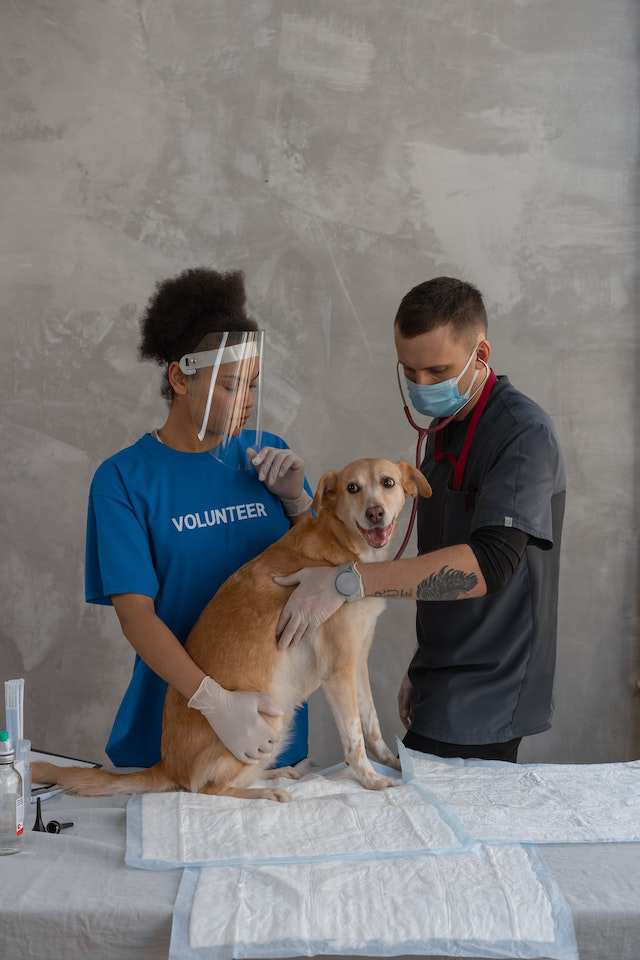
After receiving the rabies vaccine, some dogs may develop gastrointestinal issues like vomiting or diarrhea.
Numerous reasons, such as the body’s reaction to the vaccine or susceptibility to vaccine ingredients, might cause these symptoms.
Withholding meals for a few hours will help manage these sensations while allowing the stomach to settle.
After that, reintroduce a bland meal in modest amounts, such as cooked chicken and rice.
Consult your veterinarian as soon as possible if your dog’s vomiting or diarrhea worsens or lingers, or if your dog displays indications of dehydration.
6. Reduced Appetite
The rabies vaccine’s negative effects can include appetite loss. It’s possible for some dogs to momentarily lose the urge to eat.
By providing your dog with quick, tasty meals on a regular basis, you can encourage them to eat. To make the food more appetizing, reheat it up a little or add some warm water.
Consult your veterinarian for help if your dog refuses to eat for more than 24 hours or displays extreme appetite loss, in order to make sure they continue to receive the correct nutrition.
7. Mild Fever
On rare occasions, dogs who receive the rabies vaccine may experience a moderate fever.
This is typically nothing to worry about and shows that the immune system is reacting to the vaccine.
However, it’s crucial to keep an eye on their body temperature. For more advice, if the animal’s core temperature rises above 103 °F (39.4 °C), speak with your veterinarian.
Maintaining your dog’s fluid intake and providing a cozy environment with suitable ventilation will help control a low fever and prevent overheating.
8. Itching and Skin Irritation
Following rabies immunization, dogs may have minor skin irritation or itching.
This might happen as a result of the immunological response the vaccine-induced.
It’s vital to avoid excessive licking or scratching, as these behaviors can cause more irritation or even infection.
To ease discomfort and lessen itching, talk to your veterinarian about using a mild, pet-safe antihistamine or an anti-itch spray.
Based on the particular requirements of your dog, your veterinarian can suggest suitable items.
9. Sneezing or Mild Nasal Discharge
The rabies vaccine could result in minor respiratory side effects such as sneezing or nasal discharge.
Typically, these symptoms are short-lived and go away on their own in a short time.
Ensure that your dog has access to fresh air and keep them away from other potential allergens or irritants, such as cigarette smoke or harsh scents.
Consult your veterinarian for additional testing and advice if the symptoms worsen or continue, or if your dog exhibits signs of respiratory distress.
10. Systemic Reactions
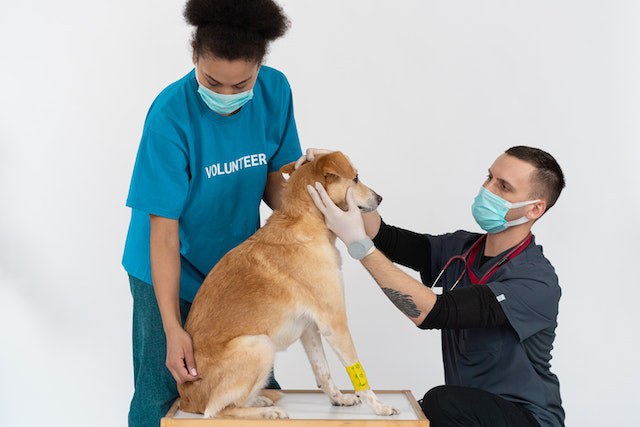
A very small percentage of the time, dogs may have more serious systemic reactions to the rabies vaccine, including allergy or neurological problems.
These responses need rapid veterinary care. Be on the lookout for symptoms of anxiety, breathing difficulties, seizures, or disorientation, and seek immediate medical attention.
Despite the extreme rarity of these responses, it’s crucial to be aware of the potential risks and take action right away if any serious symptoms manifest.
11. Transient Behavior Changes
Following rabies immunization, some dogs may experience brief behavioral changes.
Changes in sleep habits, increased restlessness, and irritability are a few of them.
It’s crucial to give your dog a tranquil and relaxing atmosphere at this time.
Make sure they have comfortable toys, a peaceful area to rest, and a schedule that encourages relaxing.
If the behavioral alterations continue or become worrisome, seek advice from your veterinarian.
Learn more about the importance of vaccines for dogs.
What to Do If You Notice Rabies Vaccine Side Effects in Dogs
If you notice any side effects after your dog’s rabies vaccination, it’s important to contact your veterinarian immediately for advice.
Some common side effects of the rabies vaccine in dogs include lethargy, fever, and loss of appetite.
More serious allergic reactions, such as difficulty breathing or vomiting, may also occur. If you notice any of these symptoms, seek emergency veterinary care for your dog.
Your veterinarian may recommend medication or other treatments based on the severity and type of side effects your dog is experiencing.
Learn more about health issues with dogs.
Managing and Minimizing Side Effects of Rabies Vaccine in Dogs
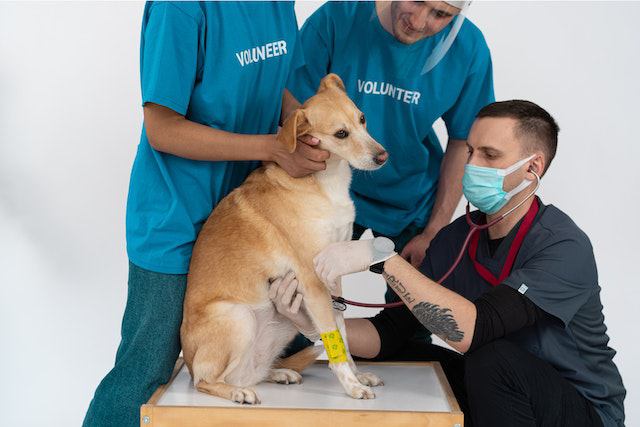
Rabies is a deadly virus that can affect both humans and animals, including dogs. However, vaccination against rabies is an effective means of preventing the disease in dogs.
Here are some common ways of managing and minimizing the side effects of the rabies vaccine on dogs:
- Give Pain Medication: If your dog is experiencing pain or soreness at the injection site, you can give them pain medication such as carprofen or meloxicam to reduce the discomfort.
- Ice the Injection Site: Applying a cold pack of ice to the injection site can help to reduce inflammation and soreness.
- Monitor Your Dog: Keep a close eye on your dog after they receive the vaccine. Watch for any signs of allergic reactions, such as swelling or difficulty breathing.
- Restrict Physical Activity: Encourage your dog to rest and restrict their physical activity for a day or two after they receive the vaccine.
- Provide Plenty of Water: Drinking plenty of water can help to flush any toxins out of your dog’s system and reduce the risk of dehydration.
- Give Nutritional Support: Providing your dog with good nutrition, including nutrient-rich food and supplements, can support their immune system and help them to recover more quickly.
- Use a Different Injection Site: If your dog experiences significant pain or swelling at the injection site, ask your veterinarian to use a different injection site for future vaccines.
- Administer in Combination with Other Vaccines: Combining the rabies vaccine with other vaccines, such as those for distemper or parvovirus, can help to minimize the number of injections your dog needs and reduce the risk of side effects.
- Give your dog some rest: Resting is always helpful after vaccination. Allow your dog ample time to rest and recover after the vaccination.
- Talk to Your Veterinarian: If your dog experiences any significant side effects from the rabies vaccine, talk to your veterinarian. They may be able to recommend additional treatments or medications to help manage the symptoms.
Related Questions
What are the most common side effects of the rabies vaccine in dogs?
Some of the most common side effects of the rabies vaccine in dogs include lethargy, fever, and reduced appetite. These side effects are usually mild and go away on their own within a few days.
Are there any more serious side effects that I should be aware of?
Yes, although rare, there can be more serious side effects such as allergic reactions, vomiting, and diarrhea. If you notice any unusual symptoms in your dog after getting the rabies vaccine, you should contact your veterinarian right away.
Can older dogs experience more side effects from the rabies vaccine?
It’s possible, as older dogs tend to have weaker immune systems and may have a more challenging time handling vaccines. However, this doesn’t mean that all older dogs will experience more side effects.
How soon after receiving the rabies vaccine might my dog experience side effects?
Side effects usually appear within a few hours to a few days after receiving the vaccine.
Is it necessary for my dog to get the rabies vaccine, even if there are risks involved?
Yes, it is necessary for your dog to receive the rabies vaccine as it is required by law in most states and is crucial for protecting both your dog and other animals from the deadly rabies virus.
Are there any steps I can take to minimize the risk of side effects after my dog receives the rabies vaccine?
While it’s impossible to completely eliminate the risk of side effects, there are steps you can take to minimize the risk. For example, you can make sure your dog is in good health before getting the vaccine, and keep an eye on your dog for any unusual symptoms afterward. Additionally, always make sure your dog receives vaccinations from a licensed and reputable veterinarian.
Conclusion
In conclusion, while the rabies vaccine is a necessary preventative measure for your furry friend’s health, it also comes with potential side effects.
From mild symptoms like lethargy and fever to more serious issues such as seizures and anaphylaxis, it’s essential to monitor your dog closely after receiving the rabies vaccine.
Always remember to inform your veterinarian of any concerning behaviors or symptoms. By staying informed and vigilant, you’ll help ensure a happy and healthy life for your beloved pup!
